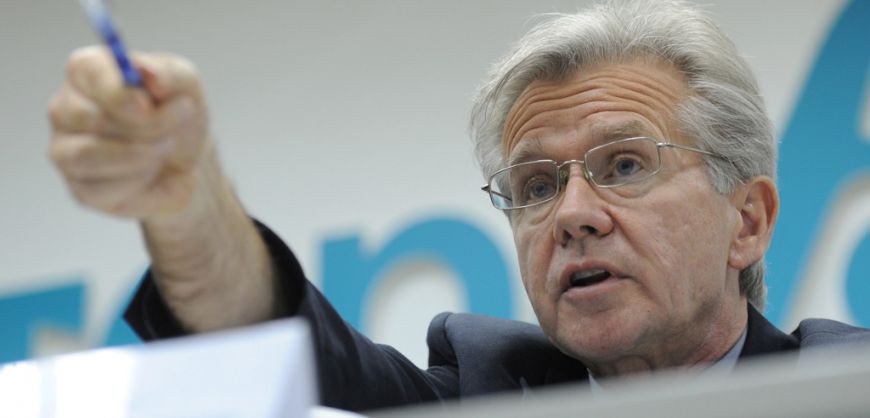During a press briefing by Gerry Rice, the Communications Department Director of the International Monetary Fund, most of the attention was focused on Greece.
Below is a Q&A transcript of what was said:
Question: The Greek people almost two weeks ago sent a message, that they don’t want any more austerity. They want growth. They want to see their lives change. We heard the same message, I can say, from President Obama. I wanted to know, since you are a part of the Troika, what is your answer? What is your message to the Greek people?
Rice: Let me step back for those who don’t follow it closely. As we have confirmed this week there was an introductory meeting with the authorities over the weekend. Greece’s finance minister, Mr. Varoufakis, and our head of the European Department, Poul Thomsen, met to get acquainted, and to discuss the challenges facing Greece. Specific policy issues were not discussed in any detail. I can tell you there have not been other high-level contacts at this time.
Question: Have not?
Rice: There have not been other high-level contacts at this time. However, we continue to exchange information at the technical level, mainly through our Resident Representative in Athens. We look forward to discussing with the new government their economic plans. Until then, making any assessment of the country’s economy and the status where it stands would be premature. We are looking forward to hearing from the authorities on their proposals, their ideas. We haven’t had those discussions as yet. I think once we’re able to do that we’d be able to be a bit more specific.
Question: There are reports that they’re saying that you want to get out of the Troika. Can you give us an answer on this question?
Rice: We should not get ahead of ourselves here. We are waiting to hear from the Greek authorities as to how they would wish to engage and to go forward. The precise modalities are a subject for discussion.
Question: We began the discussion by talking about debt relief for Ebola stricken countries. I mean, one of the hot topics of discussion on the Greece issue has been the idea of a debt write-down. I’ve heard varying descriptions of the IMF’s position on this. Could you clarify? Would the IMF be, in any way, willing to accept some type of restructuring or debt write-down, some type of debt relief for Greece?
Rice: There’s an agreed framework in place for dealing with Greece’s debt under the program. There has been no discussion with the authorities on a change in this framework. I won’t repeat the framework again. I can if people wish me to, but we’ve said many times at this podium and discussed it in this room, many, many times what that framework is, but I can repeat it if you like.
Under the program there’s an agreed framework in place for ensuring debt sustainability with Greece’s European partners agreeing to provide any additional debt relief as needed to help bring Greece’s debt down to 124 percent of GDP by 2020, and to substantially below 110 percent of GDP by 2022, as long as Greece continues to deliver on its program commitments. That’s the framework. It’s been restated many times. It’s a framework agreed by the Eurogroup and with Greece prior to the current administration.
Question: You said that there have not been other high-level meetings with the Greek government up until now, but when are you planning to do so? And I’m not talking about introductory meetings at this time. I’m talking about meetings where, maybe, policies will be discussed?
Rice: I don’t have a date for you. I don’t have a timeline for you on that.
Question: Is the IMF willing to consider a lowering of the target for the primary surplus for Greece as the Greek government would like?
Rice: We have not had the policy discussions with the authorities as yet. We look forward to that, and until we have those discussions, we don’t really get into the specifics.
Question: Under what conditions would such a deal be made? Would it have to be combined with debt restructuring?
Rice: It’s all speculation and, I wouldn’t be serving anyone to get into speculation.
Question: Can you please tell us what you think of the decision by the ECB to no longer accept Greek debt as collateral? Don’t you feel it could worsen the economic situation of the country?
Rice: We’ve not been in a position to make an assessment of where the Greek economy stands at this point, so we look forward to being able to do that at some point in the future. So it would be impossible for me to give an assessment of the decision. It should be taken up with the Greek authorities and with the ECB.
Question: But most of the time you are in a position of commenting on the decision by ECB right after they’re being announced. Why are you not in the same position today?
Rice: We actually don’t comment decision by decision on the ECB.
Question: Yes, you do.
Rice: No, we don’t. Actually we don’t. We comment on some of the major decisions that the ECB takes. We do not comment on every decision of the ECB, and in this case, we’re not in a position to do it because we have not been able to make an assessment of exactly where the Greek economy stands.
Question: So just to make it clear, you don’t see that as a major decision, right?
Rice: I’m going to move on.
Question: I understand you cannot comment on the Greek economy as it currently stands nor the current bailout program. But speaking more philosophically, the Fund works with its members, so if Athens, as a member, requests to deal in isolation from the Troika the Fund would certainly respect and prioritize the members’ desires over that of other members who might want something different for the country.
Rice: You’re right in the sense that the IMF is here to serve our member countries in the best way that we possibly can. In order to do that, we need to have a substantive policy discussion. Including on the modalities, the modus operandi, the way in which the authorities would wish to engage and move forward. At this point it’s speculative as to what the details of that would be.
Question: Secondly, looking back at the creation of the program, the 2010 bailout, the IMF has said publicly, and documents have privately indicated that the program was built not just for Greece itself. The program was also built to help contagion throughout the rest of the Euro Zone. That program did not include debt restructuring, and it did include what totaled out to $300 billion in loans. That required a specific fiscal adjustment that totaled, however many percentage points of GDP. Since that program was designed for the rest of Europe, philosophically, does the IMF not see an onus on the rest of Europe to help in the furthering of the financing of Greece since the Greek people bore the brunt of that adjustment?
Rice: I mean, it’s a bit of history. I wouldn’t accept your characterization of the program, that this was a program done for the rest of Europe only. This was a program, that was done, first and foremost, to help the Greek government and the Greek people address what was a major economic crisis. At the same time, to help the rest of Europe avoid any spillover, contagion risks that might emerge. So I’m just trying to clarify what we’ve also said on the record and probably in the same study on 2010 that you’re thinking about. That this was also a program that was done, first and foremost, with the needs of Greece in mind. On your other point, do we think that the rest of Europe and the European partners should support Greece? Of course, that’s the mode we’ve been in now since the 2010 program. Over the last five years we’ve been completely in that mode of working with the rest of Europe, manifest through the Eurogroup and other means to help to support Greece. We want to continue in that mode, and to support Greece in a way that would be returning to the first point, beneficial to Greece, and beneficial to the rest of Europe. That’s what the discussions will be going forward.
Question: But the fiscal adjustment would have been different for Greece, would have been smaller for Greece if the contagion factor had not been there. Specifically, the IMF would have done a debt restructuring which would have reduced the fiscal adjustment requirements on the Greek people. It is that specific request that I’m talking about. Forgive me for belaboring the point, but it’s an important one.
Rice: I’m not going to debate the 2010. I will take one more.
Question: On the Troika, at this point two of the three partners either want out of it or, want it dramatically changed. The ECB says there’s a conflict of interest. Jean-Claude Juncker is saying there’s no democratic control. Can you say anything? If two of the three want out, what does the IMF say about what its future is?
Rice:I haven’t heard those official statements from the ECB and the EC. I can only reiterate that we have not had the discussion with the new Greek authorities. We look forward to those discussions. We want to respect the new government, the issue is how they plan to move forward. How they wish to engage, and we look forward to that discussion.
Question: One question on Greece and a second on Ukraine. On Greece, the IMF in the past has released some staff notes about growth-linked bonds, GDP-linked bonds, and was generally supportive of them. As you may have seen, the Greek authorities have proposed, obviously not discussing with you, but in general, swapping up some of their IMF debt for growth-linked bonds. What’s your opinion on that?
Rice: I won’t speculate because we’ve not discussed with the authorities any proposal. The broader issue is something that we may have looked at in terms of our research and analysis over time. So we can connect you with the Research Department after this or someone who might have something on that. Is that okay with you?
Question: That sounds great. Then a follow-up on Ukraine. As you may have seen, the central bank today announced that they’re no longer having these foreign exchange auctions, and the currency plunged a further 30 percent. What’s your assessment of the government’s move?
Rice: On the central bank’s announcement today, I can say this. The NBU’s decision to cease foreign exchange auctions is appropriate, and should also help to eliminate multiple exchange rates. The increase of the NBU’s policy rate would help contain inflation and support the currency.
Question: On Greece, you’re looking forward to start discussing with the government, and how they want to engage from now on. Does that mean that you are willing to listen to their proposals, and maybe that you are not insisting on the current framework on the Greek program?
Rice: We are ready, willing, and looking forward to discussing the ideas, the proposals, the policy direction that the new government would wish to take, and that is absolutely something that we look forward to discussing with them. But we haven’t yet.
Question: Mr. Moghadam, former head of the IMF European Department, sent a letter to the Financial Times the day after the Greek elections on January 6th, and he said, and I quote, Europe should offer a substantial debt relief in Greece, halving Greece’s debt and halving their required fiscal balance in exchange for reforms. In the same letter he took responsibility for some of the mistakes. What is your comment on his letter? Do you believe that Europe should offer a substantial debt relief to Greece and reduce the pace of the fiscal adjustment?
Rice: We don’t comment on opinion pieces or letters in any newspaper. On your second question, there’s an agreed framework in place for dealing with Greece’s debt in the current program, including commitments to debt relief provided that, the program remains on track. We have not had discussions with the authorities further to that, so I can’t really say much more at this point.


































